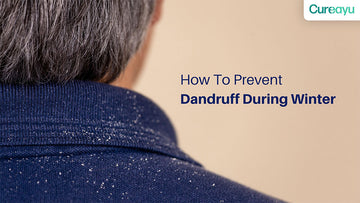Winter brings chilly weather, cozy sweaters, and often an uninvited guest—dandruff. This common scalp condition tends to worsen during the cold months, leaving many struggling with white flakes and itchy scalps. Dandruff not only affects your appearance but can also lead to discomfort and irritation, impacting your confidence.
While dandruff is not a serious medical issue, it can be persistent and challenging to manage. Understanding its causes, signs, and preventive measures during winter is the key to maintaining a healthy scalp. This blog delves into the causes of dandruff in winter and offers practical tips and treatments to keep your scalp flake-free.
Also Read: Best Vitamins for Hair Growth: Unlock the Secrets to Luscious Locks
Dandruff in Winters
Dandruff, also known as seborrheic dermatitis, becomes more prevalent in winter due to environmental and physiological factors. The cold air outside combined with dry indoor heating strips moisture from the scalp, making it prone to dryness. A lack of humidity in the air worsens this condition, leading to flaky, itchy skin. Additionally, wearing woolen hats and scarves can create an environment conducive to fungal growth, further aggravating dandruff.
Winter-related dandruff is often more persistent because the scalp’s natural barrier weakens in dry conditions. This results in increased sensitivity to fungi like Malassezia, a common trigger for dandruff. Hence, adopting seasonal hair care routines is crucial to managing this issue effectively.
Signs and Symptoms of Dandruff
-
Flaky Scalp
White or yellowish flakes on your scalp, shoulders, and hair are the most obvious signs of dandruff. These flakes are dead skin cells that shed due to an irritated or dry scalp. -
Itchy Scalp
Persistent itchiness is a common symptom, especially in dry, cold conditions. Scratching can exacerbate the problem by causing redness and minor wounds on the scalp. -
Scalp Redness
Inflammation and redness often accompany dandruff, especially when caused by fungal infections or a sensitive scalp. -
Dryness
A lack of moisture in the scalp leads to tightness and dryness, which are precursors to flaking. -
Hair Thinning
Chronic dandruff can weaken hair roots, leading to increased hair fall or thinning over time.
Also Read: Managing Scalp Yeast Infections: Protecting Hair and Scalp Health
Why Dandruff Occurs in Winters
Causes of Dandruff in Winter
Winter dandruff stems from several factors, all of which revolve around the season’s harsh impact on the scalp.
-
Dry Air and Low Humidity
Winter air lacks moisture, leaving the scalp dry and flaky. Dryness is one of the most significant causes of dandruff in winter, as it disrupts the skin’s natural oil balance. -
Overuse of Indoor Heating
Central heating systems make indoor air excessively dry, which exacerbates scalp dehydration and encourages dandruff formation. -
Frequent Use of Woolen Hats
While woolen hats keep us warm, they also trap heat and sweat, creating an ideal environment for fungal growth. -
Reduced Hair Washing
Many people wash their hair less frequently in winter, fearing that cold water may cause discomfort. However, this can lead to the accumulation of oil, dirt, and dead skin, worsening dandruff. -
Weakened Scalp Barrier
Cold weather impairs the skin’s natural defense mechanism, making the scalp more prone to fungal infections and irritation.
How To Prevent Dandruff During Winter
- Moisturize Your Scalp
Use hydrating hair oils like coconut, argan, or almond oil to nourish the scalp and prevent dryness. Apply warm oil to your scalp weekly and leave it on for 30 minutes before washing.
- Avoid Hot Showers
Hot water strips the scalp of natural oils, leading to dryness. Opt for lukewarm water when washing your hair to maintain moisture levels.
- Choose a Gentle Shampoo
Use an anti-dandruff shampoo with ingredients like zinc pyrithione, ketoconazole, or salicylic acid to combat dandruff without over-drying your scalp.
- Exfoliate Regularly
Scalp scrubs can help remove dead skin cells and excess oil, keeping your scalp clean and flake-free. Use a mild exfoliating product once a week.
- Stay Hydrated
Drink plenty of water to keep your skin, including your scalp, hydrated from within. Proper hydration helps prevent dryness and flaking.
- Eat a Balanced Diet
Incorporate foods rich in omega-3 fatty acids, zinc, and vitamins B and E to promote scalp health. Nutritional deficiencies can exacerbate dandruff.
Also Read: Navigating Hair Loss Causes: Practical Tips for Prevention and Treatment
Winter Dandruff Treatment
- Medicated Shampoos
Anti-dandruff shampoos with ingredients like selenium sulfide or coal tar are effective treatments. Use them as directed by a dermatologist.
- Natural Remedies
Home remedies such as applying aloe vera gel, tea tree oil, or apple cider vinegar can soothe an itchy scalp and reduce flakes.
- Moisturizing Masks
Hair masks made with yogurt, honey, or avocado can deeply moisturize the scalp, addressing dryness and flaking.
- Topical Treatments
Prescription-based treatments like corticosteroid lotions or antifungal creams can help manage severe cases of dandruff.
Conclusion
Dandruff during winter can be a persistent and uncomfortable problem, but with the right care and remedies, it is manageable. Understanding the root causes of dandruff in winter helps you adopt preventive measures such as moisturizing your scalp, using the right shampoo, and maintaining a balanced diet. For those struggling with severe dandruff, treatments ranging from medicated shampoos to natural remedies offer effective solutions.
By following these tips and treatments, you can enjoy the winter season without worrying about dandruff. A healthy scalp is just a few mindful steps away—stay consistent with your routine and embrace the cold months confidently!








